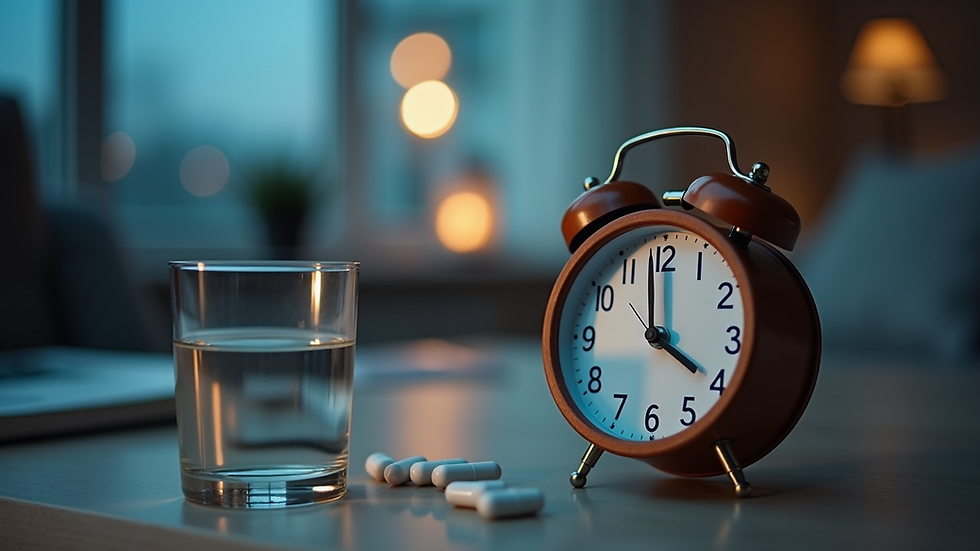How Medications Can Support Healthy Sleep Patterns
- Derrick Smith
- Aug 5, 2025
- 3 min read
Getting a good night's sleep is essential for overall health and well-being. However, many people struggle with sleep issues such as insomnia, restless nights, or difficulty falling asleep. While lifestyle changes and sleep hygiene are the first steps to improving sleep, medications can sometimes play a supportive role. This article explores how medications can help establish and maintain healthy sleep patterns, the types of medications available, and important considerations for their use.
Understanding Healthy Sleep and Its Importance
Healthy sleep is more than just the number of hours spent in bed. It involves cycling through different sleep stages, including deep sleep and REM sleep, which are crucial for physical and mental restoration. Poor sleep can lead to fatigue, impaired concentration, mood disturbances, and long-term health problems such as cardiovascular disease and diabetes.
To promote healthy sleep, it is important to maintain a consistent sleep schedule, create a relaxing bedtime routine, and manage stress. However, when these measures are not enough, medications may be considered to support the sleep process.

Medications That Support Healthy Sleep Patterns
Several types of medications can help improve sleep quality and duration. These include:
1. Over-the-Counter (OTC) Sleep Aids
OTC sleep aids often contain antihistamines, which can cause drowsiness. They are generally used for short-term relief of occasional sleeplessness. Examples include diphenhydramine and doxylamine. While these can be effective, they may cause side effects such as dry mouth, dizziness, and next-day grogginess.
2. Melatonin Supplements
Melatonin is a hormone that regulates the sleep-wake cycle. Supplements can be helpful for people with disrupted circadian rhythms, such as shift workers or those experiencing jet lag. Melatonin is generally safe for short-term use but should be taken at the right time to be effective.
3. Prescription Sleep Medications
Doctors may prescribe medications such as benzodiazepines, non-benzodiazepine hypnotics, or certain antidepressants to treat chronic insomnia or other sleep disorders. These medications work by affecting brain chemicals that regulate sleep.
One commonly prescribed medication is diazepam, which belongs to the benzodiazepine class. It has muscle-relaxing and calming effects that can help people fall asleep and stay asleep.

4. Herbal Remedies
Some people use herbal supplements like valerian root or chamomile to promote relaxation and sleep. While these are generally considered safe, their effectiveness varies and they are not regulated as strictly as medications.
How Quickly Does Diazepam Work for Sleep?
Diazepam is known for its relatively fast onset of action. When taken orally, it usually starts working within 30 to 60 minutes. This makes it useful for people who have trouble falling asleep quickly. However, the duration of its effects can last several hours, which may cause drowsiness the next day if taken late at night.
It is important to use diazepam under medical supervision because of the risk of dependence and tolerance. It is typically prescribed for short-term use or occasional sleep difficulties rather than chronic insomnia.

Practical Tips for Using Medications to Support Sleep
If you are considering medications to help with sleep, here are some practical recommendations:
Consult a healthcare professional before starting any medication to ensure it is appropriate for your condition.
Follow the prescribed dosage and timing carefully to avoid side effects and dependence.
Combine medication use with good sleep hygiene practices, such as avoiding screens before bed, limiting caffeine intake, and creating a comfortable sleep environment.
Avoid alcohol and other substances that can interfere with sleep quality.
Monitor your sleep patterns and any side effects, and report them to your doctor.
Use medications as a short-term aid while working on long-term lifestyle changes to improve sleep.
For those interested in benzodiazepine options, diazepam for sleep can be an effective choice when used responsibly and under medical guidance.
When to Seek Professional Help for Sleep Issues
While medications can support healthy sleep, persistent sleep problems may indicate underlying health issues such as sleep apnea, restless leg syndrome, or mental health disorders. If you experience:
Difficulty falling or staying asleep for more than a few weeks
Excessive daytime sleepiness
Loud snoring or gasping during sleep
Mood changes or cognitive difficulties
It is important to seek professional evaluation. A sleep specialist can conduct tests and recommend appropriate treatments, which may include therapy, lifestyle changes, or specialized medications.
Medications can be a valuable tool in supporting healthy sleep patterns when used correctly. They should complement, not replace, good sleep habits and a healthy lifestyle. By understanding the options available and working closely with healthcare providers, individuals can improve their sleep quality and overall well-being.
























Comments